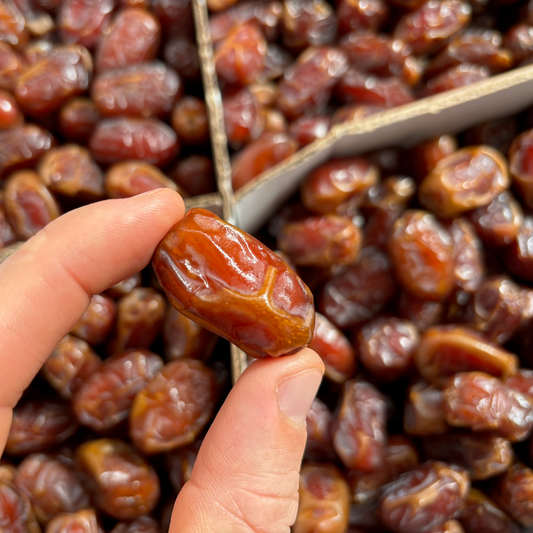Fresh this week
The beauty of the Spring Lady peaches this year is remarkable. They have an unusually deep blush for an early peach, showing the “inverse shadows of leaves across the skin,” as Nikiko says. The flavor is so bright. Peaches are HERE!! Nikiko reminds us that the fruit tells you when it’s ready to harvest – these peaches wait for no one. Once the season starts, it's go time. It takes a conscious effort to slow down and appreciate each variety before it’s on to the next one. The Masumoto family puts so much care into growing, harvesting, and packing their fruit. You can really taste it in every bite. They grow varieties that aren’t so common anymore – maybe a little fuzzier, a bit smaller, and perhaps so juicy you’ll have to eat it over the sink. But the flavor! Enjoy the Spring Lady peaches, the next variety is just around the corner! Store on the counter, with a little elbow room between them. Grown organically by Masumoto Family Farm in Del Rey.
Rose Diamonds are the first yellow nectarine variety that ripens at Masumoto Family Farm. It just so happens to be one of our favorites, too! Nikiko says Rose Diamonds are in “fighting shape” this season, “with a flavor blast and sparkly tart high notes!” They boast high sugar and high acid, finding balance in dynamism. This variety tends to run a little smaller so it’s fallen out of style, becoming less common in commercial production. But they are just so good! Fun fact, nectos and peaches are genetically identical with the exception of one gene: a recessive gene that makes them fuzzless! Store on the counter, with a little elbow room between them. Grown organically by Masumoto Family Farm in Del Rey.
Apriums were developed right here in California by Floyd Zaiger. (Zaiger is also the original breeder of pluots, too – what a legacy!) Apriums are a hybrid developed with both apricot and plum parentage, with roughly 75% apricot genetics and 25% plum genetics. That makeup is why we see more apricot characteristics in apriums (and vice versa in a pluot). These Escort Apriums from Toby at Free Spirit Farm have a beautiful bright orange skin. They’re freestone, GIANT, and have the velvety skin of an apricot. Toby has to outrun the birds and other wild aprium-lovers, so although they’re harvested fully ripe, you can let them sit on the counter a bit to soften. Store on the counter. Grown organically by Free Spirit Farm in Winters.
Farmers Cathy and Michael of Spreadwing Farm grow so many different and tasty stone fruit varieties. One of the earliest varieties to ripen are the Katy apricots. Beautiful blush, velvety soft skin, melt-in-your-mouth flesh, and nectary juice that’s oh so sweet – this is why they chose to grow the Katy. And bonus, they’re freestone! They’re great for baking, drying, and of course eating fresh. Store on the counter. Grown organically by Spreadwing Farm in Rumsey.
Jim Cochran has been growing strawberries organically for 40 years and he grows our FAVORITE version: the sweet, tender, juicy, Chandler strawberry. Right now, the Chandler is shining. It’s a June-bearing variety, so its production peaks in early and mid-season. The plants are producing loads of big, glossy, beautiful berries. The heat this week is a bit of too much of a good thing. The warm days pushed ripeness further, but Jim had to time the harvesting strategically so they wouldn’t get zapped by the highest temps. They are riper than the berries we’ve had in the last month so enjoy them quickly! Store in the fridge. Grown organically by Swanton Berry Farm in Davenport.
Encore appearances
We’re onto Coastal Moon’s last blueberry variety: San Joaquin blueberries. These are lighter in color with a heavier “bloom” on the skin. The frosty luster is a natural layer blueberries produce to protect against intense sun. These San Joaquins are bloomin’ real nice which means the Coastal Moon crew harvested them at the perfect time. These are so sweet and so flavorful! We’ve got until the end of June to enjoy this last variety. Store in the fridge. Grown organically by Coastal Moon Farm in Freedom.
These purple Pakistan mulberries from Habitera Farms are super juicy and taste like berry jam! We visited farmers Luis and Jorge right as the season was starting up to see how the orchard was looking. (This may be world-altering but yes, mulberries are botanically trees. They are often pruned and shaped into shrubs because, left to their own devices, they can get up to 60 feet tall!) These mulberries are a real labor of love. Jorge has five decades of experience working in tree fruit orchards, and his pruning and shaping of the trees is art. At harvest, nets are rolled through the orchard to catch the ripe fruit that falls as the crew shakes the tree’s branches. And then the post-harvest handling of these delicate little morsels requires even more care. Eat ’em quick. They won’t (and shouldn’t) last long. Store in the fridge. Grown sustainably by Habitera Farms in Brentwood. (Habitera will be fully CCOF-certified Organic at the end of 2025. For more on the transition to organics, read on.)





